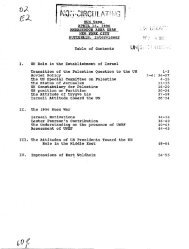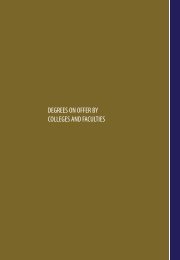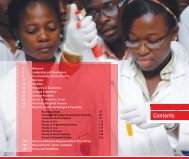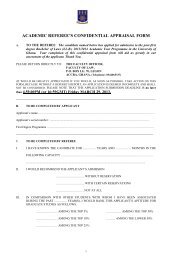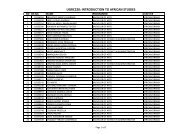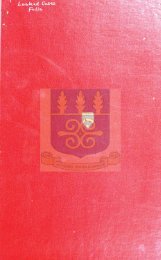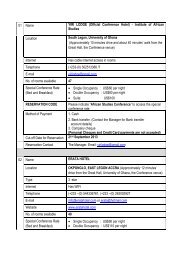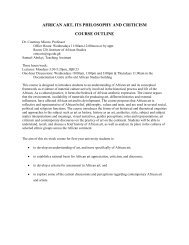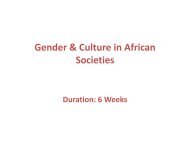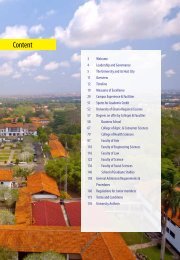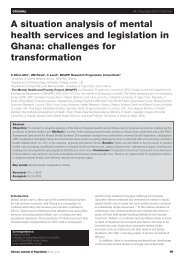- Page 1 and 2: August, 2009 UNIVERSITY OF GHANA HA
- Page 3 and 4: © The University of Ghana A public
- Page 5 and 6: 15. Faculty of Law .. .. .. .. .. .
- Page 8 and 9: THE UNIVERSITY OF GHANA GENERAL INF
- Page 10 and 11: UNIVERSITY OFFICERS CHANCELLOR Mr.
- Page 12 and 13: Institute of Agricultural Research
- Page 14 and 15: University of Ghana Business - Mr.
- Page 16 and 17: ESTABLISHMENT OF THE UNIVERSITY THE
- Page 18 and 19: 14. Wisconsin University College, G
- Page 20 and 21: KPONG AGRICULTURAL RESEARCH CENTRE:
- Page 22 and 23: THE DENTAL SCHOOL: The University o
- Page 26 and 27: Programme for Research and Training
- Page 28 and 29: contains plant species of the tropi
- Page 30 and 31: CENTRE FOR MIGRATION STUDIES The Ce
- Page 32 and 33: Bachelor of Dental Surgery (BDS) as
- Page 34 and 35: 4. STUDENT FACILITIES AND SOCIETIES
- Page 36 and 37: the Hall is carried out by the Ward
- Page 38 and 39: JUNIOR COMMON ROOM (JCR): There is
- Page 40 and 41: OFFICE OF STUDENTS WITH SPECIAL NEE
- Page 42 and 43: 5. ALUMNI ASSOCIATION A national as
- Page 44 and 45: 7. REGULATIONS FOR JUNIOR MEMBERS 1
- Page 46 and 47: 13. FORMATION OF SOCIETIES AND CLUB
- Page 48 and 49: v. Throw any person into ponds in t
- Page 50 and 51: You also have a defence (called "fa
- Page 52 and 53: 8. UNIVERSITY EXAMINATIONS INSTRUCT
- Page 54 and 55: from any paper at a University Exam
- Page 56 and 57: 9. REGULATIONS FOR THE BACHELOR'S D
- Page 58 and 59: Engineering Science/Pharmacy (BSc
- Page 60 and 61: Individuals with such qualification
- Page 62 and 63: maximum shall be 12 semesters. For
- Page 64 and 65: egistered for the BSc Agriculture d
- Page 66 and 67: programme for Major in any particul
- Page 68 and 69: satisfactorily the approved course(
- Page 70 and 71: shall be asked by the Registrar to
- Page 72 and 73: Faculty of Engineering Sciences the
- Page 75 and 76:
APPROVED GROUPING OF SENIOR SECONDA
- Page 77 and 78:
SSSCE SUBJECT CLASSIFICATION FOR AD
- Page 79 and 80:
History and Politics Section Kojo O
- Page 81 and 82:
11. LEVEL 100 COURSES THE HUMANITIE
- Page 83 and 84:
English Candidates must obtain pass
- Page 85 and 86:
BUSINESS SCHOOL S. Takyi-Asiedu, BS
- Page 87 and 88:
LEVEL 300 COURSES Core UGBS 301 Qua
- Page 89 and 90:
LEVEL 400 COURSES UGBS 402 Core Bus
- Page 91 and 92:
Core UGBS 402 Business Policy MKTG
- Page 93 and 94:
LEVEL 300 COURSES UGBS 301 Quantita
- Page 95 and 96:
Electives (Three elective courses t
- Page 97 and 98:
OHRM 404 Manpower Planning 3 MKGT 4
- Page 99 and 100:
UGBS 301 Quantitative Methods This
- Page 101 and 102:
potential sales force managers with
- Page 103 and 104:
PAHS 312 Export Administration Expo
- Page 105 and 106:
FINC 406 Investment Fundamentals Th
- Page 107 and 108:
as skills acquired from other funct
- Page 109 and 110:
systematic appraisal of health care
- Page 111 and 112:
CLAS 319: History of the Hellenisti
- Page 113 and 114:
colonisation movement, the evolutio
- Page 115 and 116:
CLAS 317: History of the Archaic an
- Page 117 and 118:
literature and art. This involves a
- Page 119 and 120:
CLAS 335: Reading Greek ll This sta
- Page 121 and 122:
Hyginus and Valerius Maximus; Cicer
- Page 123 and 124:
CLAS 427: The Sophists This is an i
- Page 125 and 126:
Core Courses LEVEL 300 [To be taken
- Page 127 and 128:
ENGL 459 Renaissance Drama 3 Credit
- Page 129 and 130:
can be taken apart and reassembled
- Page 131 and 132:
will also cover the cultural and hi
- Page 133 and 134:
ENGL 382 Landmarks of African-Ameri
- Page 135 and 136:
ENGL 453 Introduction to Film and T
- Page 137 and 138:
consider the peculiar difficulty in
- Page 139 and 140:
LEVEL 400 Major: At least 30 credit
- Page 141 and 142:
LING 333 Phonetics and Phonology of
- Page 143 and 144:
LING 422 Semantics (Prerequisite LI
- Page 145 and 146:
LING 444 Language and Gender The co
- Page 147 and 148:
COURSE DESCRIPTIONS GHLS 331 Oral L
- Page 149 and 150:
LEVEL 100 Courses available in Leve
- Page 151 and 152:
Courses Descriptions (Arabic) ARAB
- Page 153 and 154:
ARAB 338 Translation Into Arabic Tr
- Page 155 and 156:
ARAB 449 Gender and Identity in Mod
- Page 157 and 158:
LEVEL 300 COURSES Intending Single
- Page 159 and 160:
FREN 227 Grammar & Sentence Analysi
- Page 161 and 162:
themselves continuously, in simple
- Page 163 and 164:
and intransitive verbs, etc. The tr
- Page 165 and 166:
information, health, etc. The trans
- Page 167 and 168:
FREN 458 Professional French 4 This
- Page 169 and 170:
RUSS 447 Advanced Translation from
- Page 171 and 172:
RUSS 335 Aspects of Russian Romanti
- Page 173 and 174:
English. It is designed to expand s
- Page 175 and 176:
SPANISH FACULTY L.K. Adra, BA (Gh),
- Page 177 and 178:
SPAN 456 La Generacion Del '98 2 SP
- Page 179 and 180:
SPAN 224 Oral: Exercises In Tone Mo
- Page 181 and 182:
- Journalism in 19th Century Spain
- Page 183 and 184:
* RIMAS * SEGUNDA ANTOLOGÍA POÉTI
- Page 185 and 186:
Goyanés: Temas y Estilo d) Poetry:
- Page 187 and 188:
SWAH 114 Conversational Drills 2 SW
- Page 189 and 190:
SWAH 114 Conversational Drills Gene
- Page 191 and 192:
wise sayings and proverbs and their
- Page 193 and 194:
SWAH 457 Special Topics A course re
- Page 195 and 196:
STRUCTURE OF PROGRAMME LEVEL 300 CO
- Page 197 and 198:
TRAN 343: Written Composition and O
- Page 199 and 200:
TRAN 454: Ethics & Business Practic
- Page 201 and 202:
different views of moral goodness a
- Page 203 and 204:
PHIL 315 Aesthetics Concerns fundam
- Page 205 and 206:
PHIL 414 Contemporary Metaphysics R
- Page 207 and 208:
LEVEL 300 COURSES Major: At least 2
- Page 209 and 210:
Qur‘an. The preservation of the Q
- Page 211 and 212:
SREL 314 Arabic I (Unavailable to s
- Page 213 and 214:
SREL 352 Religion and Leadership Ex
- Page 215 and 216:
SREL 398 New Religious Movements Th
- Page 217 and 218:
Culture and ecology. Approaches to
- Page 219 and 220:
SREL 445 Modern Trends in Islam Con
- Page 221 and 222:
Level 400 Courses Core DANC 401 Dan
- Page 223 and 224:
DANC 409 Advanced Dance Technique I
- Page 225 and 226:
DANC 304 Music for Dance Analysis o
- Page 227 and 228:
(c) Dance Notation: Student will be
- Page 229 and 230:
Grace U. HassanDip. BA, MA, Theatre
- Page 231 and 232:
SPECIAL AREA ELECTIVES (YEAR-LONG C
- Page 233 and 234:
Varied assignments and roles in pro
- Page 235 and 236:
Hansbery, James Baldwin, and their
- Page 237 and 238:
8. DRAMA IN EDUCATION The philosoph
- Page 239 and 240:
MUSC 216 Practicals II Progressive
- Page 241 and 242:
Survey will include selections from
- Page 243 and 244:
MUSC 312 Chromatic Harmony Chromati
- Page 245 and 246:
MUSC 413 Music Of East Africa East
- Page 247 and 248:
LEVEL 200 BFA COURSES Courses avail
- Page 249 and 250:
escape tone, cambiata. Strict Count
- Page 251 and 252:
SPAM 325 Process of Art I Explorati
- Page 253 and 254:
SPAM 428 Music Studio Music sequenc
- Page 255 and 256:
3. Requirements for Graduation (LLB
- Page 257 and 258:
FLAW 304 Law of Contract II Vitiati
- Page 259 and 260:
FLAW 435 International Trade & Inve
- Page 261 and 262:
FLAW 451 Gender and the Law I Gende
- Page 263 and 264:
FACULTY OF SOCIAL STUDIES S. Agyei-
- Page 265 and 266:
ELECTIVES ARCH 401 Information Tech
- Page 267 and 268:
This course deals with the interact
- Page 269 and 270:
ARCH 402: Human Diversity, Peace an
- Page 271 and 272:
ARCH 415: Zooarchaeology This cours
- Page 273 and 274:
COMP 408 Data Communications and Ne
- Page 275 and 276:
Mutator Method. Constructor Stack a
- Page 277 and 278:
COMP 304 Computer Organization & As
- Page 279 and 280:
distribution. Application in Stocha
- Page 281 and 282:
ADMN 303 Computer Applications in M
- Page 283 and 284:
Strings, and their representation i
- Page 285 and 286:
COMP 407 Compiling Techniques The p
- Page 287 and 288:
the use of probability. Inside Expe
- Page 289 and 290:
Bernadin Senadza, BA MPhil (Ghana)
- Page 291 and 292:
COURSE DESCRIPTIONS ECON 101 Introd
- Page 293 and 294:
firm, market, product homogeneity,
- Page 295 and 296:
development. Economic historicism.
- Page 297 and 298:
ECON 428 Economic Planning II (prer
- Page 299 and 300:
LEVEL 300 COURSES GEOG 301 Core Soi
- Page 301 and 302:
GEOG. 203: Introduction to Weather
- Page 303 and 304:
planning theory. It also assesses t
- Page 305 and 306:
GEOG 418 Agricultural Land Use Syst
- Page 307 and 308:
DEPARTMENT OF HISTORY FACULTY D.E.K
- Page 309 and 310:
HIST 201 Historiography The course
- Page 311 and 312:
HIST 305 The Black Diaspora This co
- Page 313 and 314:
HIST 405 History of Political thoug
- Page 315 and 316:
**HIST 492 Fante States in the 18 t
- Page 317 and 318:
Policies; the African information s
- Page 319 and 320:
management, organization and develo
- Page 321 and 322:
STAT 203 Elementary Statistical Met
- Page 323 and 324:
(iii) For a ―Combined Major‖ ma
- Page 325 and 326:
MATH 332 Abstract Algebra I Introdu
- Page 327 and 328:
isomorphism and proof. Extension: O
- Page 329 and 330:
DEPARTMENT OF POLITICAL SCIENCE FAC
- Page 331 and 332:
iii) Development Studies POLI 316 S
- Page 333 and 334:
POLI 201 Introduction to Developmen
- Page 335 and 336:
POLI 321 Governance and Leadership
- Page 337 and 338:
POLI 413 Gender and Politics Theori
- Page 339 and 340:
DEPARTMENT OF PSYCHOLOGY B. Amponsa
- Page 341 and 342:
ELECTIVES PSYC 425 - Introduction t
- Page 343 and 344:
esearch in learning, elements/featu
- Page 345 and 346:
PSYC 424 Applied Social Psychology
- Page 347 and 348:
group processes in organizations, e
- Page 349 and 350:
SOWK 310 Women and Children‘s Rig
- Page 351 and 352:
SOWK 303 Social Theories for Social
- Page 353 and 354:
SOWK 403 Approaches to Counselling
- Page 355 and 356:
Post Retirement Contract Kodjo A. S
- Page 357 and 358:
CORE LEVEL 300 COURSES All Sociolo
- Page 359 and 360:
city; Industrialization and urbaniz
- Page 361 and 362:
All students combining with Sociolo
- Page 363 and 364:
SOCI 409 Gender Studies (3 credits)
- Page 365 and 366:
COMP 210 Applications Laboratory 2
- Page 367 and 368:
MATH 111 Algebra and Trigonometry I
- Page 369 and 370:
STAT 301 Probability Distributions
- Page 371 and 372:
STAT 415 Actuarial Statistics I (Fi
- Page 373:
CALENDAR FOR 2009 - 2010 ACADEMIC Y



